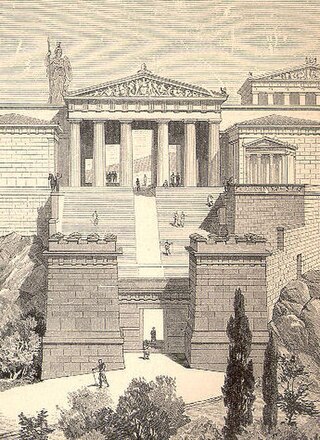Top Qs
Timeline
Chat
Perspective
Propylon
Monumental gateway in Ancient Greek architecture From Wikipedia, the free encyclopedia
Remove ads
In ancient Greek architecture, a propylon (/ˈprɒpɪlɒn/ or /ˈprɒupɪlɒn/; Ancient Greek πρόπυλον própulon)—also called a propylaeum (/prɒpɪˈliːəm/, a Latinized form of προπύλαιον propúlaion), and frequently referred to by the plural forms propyla and propylaea—is a monumental gateway.[1] It serves as a partition, separating the secular and religious parts of a city. The prototypical Greek example is the propylaea that served as the entrance to the Acropolis of Athens. The Greek Revival Brandenburg Gate of Berlin and the Propylaea in Munich both evoke the central portion.


Remove ads
Etymology
The Greek words πρόπυλον (própulon) and προπύλαιον (propúlaion) are composed of προ- (pro- 'before; in front of') + πύλη (púlē 'gate'), and originally meant 'that which is before the gate', but the word has come to mean simply 'gate building'. The latter was borrowed by Latin as propaelium.
Propylaea of the Athenian Acropolis
The propylaea were the monumental gates to the Acropolis, commissioned by the Athenian leader Pericles in order to rebuild the Acropolis at the conclusion of the Greco-Persian Wars. These propylaea were built wide enough to allow chariots through. The construction was part of Pericles' great rebuilding program for Athens in c. 437 BCE. The project of the Propylaea began once the Parthenon was almost done. It was overseen by the Athenian architect Mnesicles. Though the work was suspended due to the Peloponnesian War, the important pieces of Mnesicles' vision were able to come through. The architecture is unique in that the horizontal beams across the roof were supported by marble girders, which were supported by iron bars. The only other known use of metal in Greek architecture for structural purposes is the Temple of Zeus at Agrigento.
Remove ads
Propyla outside the Greco-Roman world
The oldest known freestanding propylaeum is the one located at the palace area in Pasargadae, an Achaemenid capital.[2]
A covered passage, called "the Propylaeum", used to face the Palace of Darius in Susa.[3]
In the 18th century, the Athenian Propylaea inspired Carl Gotthard Langhans in construction of the Brandenburg Gate in Berlin.
See also
References
Bibliography
External links
Wikiwand - on
Seamless Wikipedia browsing. On steroids.
Remove ads
